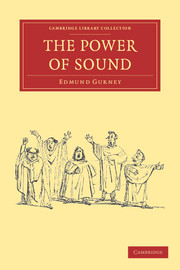
-
Select format
-
- Publisher:
- Cambridge University Press
- Publication date:
- October 2012
- October 2011
- ISBN:
- 9781139105514
- 9781108038638
- Dimensions:
- Weight & Pages:
- Dimensions:
- (229 x 152 mm)
- Weight & Pages:
- 0.84kg, 578 Pages
- Subjects:
- Music, Music: General Interest, Music Performance
You may already have access via personal or institutional login- Subjects:
- Music, Music: General Interest, Music Performance
Book description
Edmund Gurney (1847–88) is today best known for his work on psychical research, but from a young age he harboured the ambition to be a composer and performer. Frustrated in this aim, he began writing on the philosophy and psychology of music. This work of 1880 was an attempt to apply a strictly scientific method of enquiry to music, and it is regarded as one of the most important and original treatises from the nineteenth century on musical aesthetics. Gurney discusses the sensations of pleasure and pain in relation to the senses, and goes on to examine how the listener differentiates between 'noises' and 'tones'. He explores whether there is an elemental difference between a 'good' and a 'bad' melody, the ultimate futility of the critic trying to describe music, and the 'moral' conclusion to be drawn from a preference for the music of Rossini over that of Beethoven.
Contents
Metrics
Full text views
Full text views help Loading metrics...
Loading metrics...
* Views captured on Cambridge Core between #date#. This data will be updated every 24 hours.
Usage data cannot currently be displayed.
Accessibility standard: Unknown
Why this information is here
This section outlines the accessibility features of this content - including support for screen readers, full keyboard navigation and high-contrast display options. This may not be relevant for you.
Accessibility Information
Accessibility compliance for the PDF of this book is currently unknown and may be updated in the future.


